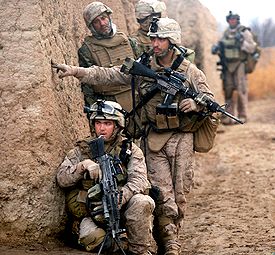Edited by Audrey Agot

Two news stories this week were illustrative of the front of counter-terrorism.
The first was the announcement by the United States on Tuesday of the death, by means of a drone attack within the confines of Pakistan, of Abu Yahya al-Libi, the number two man in the al-Qaeda terrorist network. The second news story, as told by the New York Times, was that the commander of the American Special Forces has been rejected in his request to expand his role, including the authority to train and equip local forces in countries like Yemen and Kenya.
This is a rare rejection because Admiral William McRaven, commander of Special Operations, is a favorite in the White House. McRaven is a hero, especially after having overseen the operation which resulted in the death of Osama bin Laden, in Pakistan, just a bit over a year ago. But in these times of a slimmer military budget, there is less appetite for large wars of occupation, such as in Afghanistan.
The admiral wants more authority, namely more autonomy to position his personnel and also to expand the Special Operations forces to regions where America does not operate on a large scale, such as in Asia, Africa and Latin America. McRaven has a key role in influencing the American strategy in combatting extremism, but he ends up stirring up hornets’ nests and feuds within Congress (which is responsible for liberating funding), the State Department and traditional military commanders.
For him, the rejection slowed down his stride, but there is no doubt that the impetuous McRaven is signaling the road ahead, which, although not always well lit because it is a war fought in shadows, includes the polemic about the legality of having personal decisions made by President Barack Obama himself regarding drone attack targets (even against American citizens).
In the debate about strategy, the contributions of George Friedman, president of the consulting agency Statfor, are always valuable. They are particularly valuable now, in these days when President Obama increasingly distances himself from conventional wars with smaller operations that combine intelligence with Special Forces and drone attacks. Friedman just published a text that positions himself to be clearly in favor of more agile and leaner counter-terrorism operations.
He points out the exhaustion of the doctrine of counter-insurgency (which entails occupying a territory and combatting insurgents). In the words of Friedman, “Vietnam, Iraq and Afghanistan have shown that the U.S. military is not very good at counter-insurgency. One could argue that the United States should improve its counterinsurgency capabilities, but there is little evidence that it could master such capabilities.”
For this reason, Friedman supports a type of war in which the U.S. does well. Whereas winning support of the hearts and minds of a population with the occupation of territories through painful and costly means (e.g. economic assistance, modernization and ‘nation-building’) is generally a Sisyphean task (neutralizing by mere occupation). He believes a better route would be to have defined military objectives, using lighter and more rapid operations such as elite forces or even the U.S. Marines Corps. In Friedman’s estimation, these operations would not incur the political costs associated with prolonged counter-terrorism operations and the occupation of territories. In the case of Afghanistan, for example, according to Friedman, it is essential that the country stops being a base or sanctuary for terrorism. The type of the prevailing government there is of less importance; it would be enough for them to stop sheltering terrorists.
It is a crucial debate, with lethal arguments on both sides (also taking place within the walls of West Point Military Academy), but it is worth remembering that even those more agile operations in the shadows, with special forces and unmanned drones, incur a political cost. There is a debate in the U.S. regarding the legality of the policy of selective assassinations, in which Obama plays a direct role. We have a process of deterioration of the relations between the United States and its maladjusted and untrustworthy ally Pakistan, in addition to the increase of anti-Americanism to the degree that the drone attacks are seen as a violation of sovereignty, even though the targets are seen as the worst types of political criminals.
For Americans, the cost is less. It remains to be seen if the results will be greater, with more counter-terrorism and less counter-insurgency. It is to be determined if Obama will be here for another four years to consolidate the doctrine.

Leave a Reply
You must be logged in to post a comment.